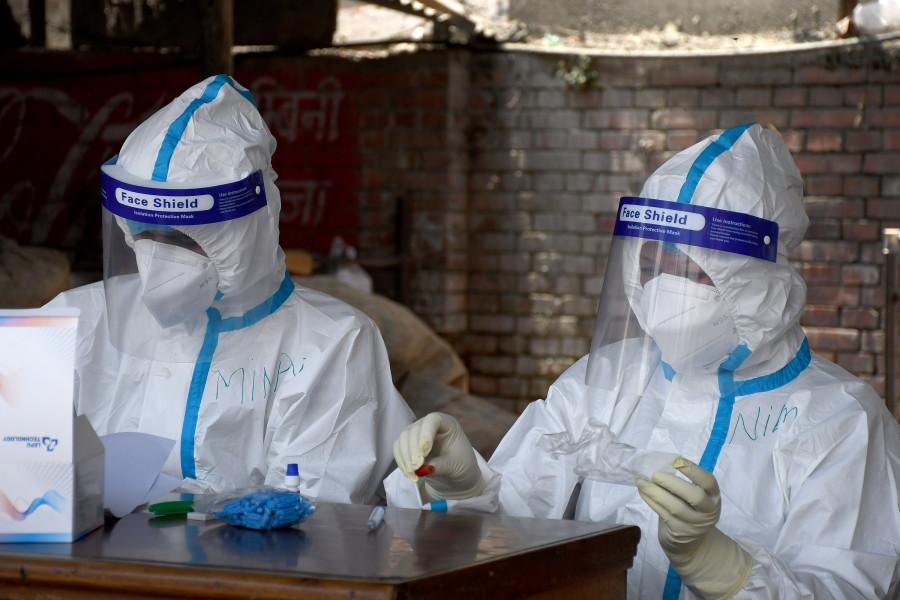Health
Asymptomatic patients to be quarantined or sent home as ministry expects 1,000 cases in a week
Health experts warn delays in tests and contact tracing will cause the coronavirus to spread in communities.
Arjun Poudel
The government has anticipated an exponential rise in the Covid-19 cases throughout the country—1,000 within a week and around 2,000 in 10 days.
The internal projection of the Covid-19 cases was made on the basis of the current increase rate of infected people and several risk factors, according to multiple officials at the Ministry of Health and Population.
[Read: Nepal reports its first Covid-19 death]
"People are entering Nepal everyday in thousands of numbers from India, and they are freely roaming throughout the country," an official at the Health Ministry, told the Post. "Most infected people found so far had either come from India or had come in contact with the people who had returned from India."
Dr Roshan Pokhrel, chief specialist at the Health Ministry, concedes that the government has expected a rise in the number of Covid-19 patients by 1,000 within a week.
"Due to our inability to restrict the movement of people, the number of Covid-19 cases has increased,"Pokhrel told the Post. "Risk of transmission in Kathmandu Valley has been raised by the people coming from other districts."
As of Saturday, the number of Covid-19 cases in the country stood at 281, including 13 in Kathmandu Valley. Of the 13 cases in the Valley, most had come from other parts of the country or had come in contact with the people carrying the coronavirus.
The Health Ministry has said that around 1,000 Covid-19 patients could be treated in hospitals in different parts of the country. But if the number of infected people exceeded 1,000 and crossed 2,000, health facilities will be overwhelmed.
Several hospitals in the Tarai region, including Narayani Hospital in Birgunj and Corona Special Hospital in Butwal, have been sending patients to quarantine facilities set up at schools due to lack of hospital beds in their facilities.
"We will have problems when the number starts exceeding 1,000,"Pokhrel said. "We will have to send asymptomatic patients to their homes when the number starts to reach the 2,000 mark. In that scenario, health facilities will have to handle ony serious cases."
The number of coronavirus cases in the country started rising after the Health Ministry increased the polymerase chain reaction (PCR) testing capacity.
Some ministry officials, meanwhile, blamed laxity in lockdown implementation for the exponential rise in coronavirus cases.
After the government eased the lockdown on May 8, they argue more people have moved from one district to another, which helped in the spread of the virus.
Ever since the lockdown restrictions were eased, thousands of people have entered Kathmandu Valley. One estimate suggests that around 5,700 people entered the Valley daily through various entry points between the period of May 8 and May 15, when the authorities once again increased the restrictions level after a record 83 coronavirus cases were confirmed in a day.
Moreover, allowing people coming from India to enter the country without ensuring proper quarantine and monitoring system has also increased the risk of the disease in the country, the officials at the ministry say.
Dr Khem Karki, advisor to Health Minister Bhanubhakta Dhakal, admits that the risk of coronavirus spread has increased in recent days.
"We cannot restrict people from entering the country for an indefinite period," Karki told the Post. "The Nepal Army has been tracking phones of people entering the Valley after the lockdown was eased to monitor their movement. It has also been inquiring about their travel history of these people."
Meanwhile, public health experts and health professionals have reiterated that the government should increase its contact tracing capacity in order to stop the virus from entering communities.
"Contact of infected people should be traced immediately to lessen the risk of widespread outbreaks," Dr Anup Subedee, consultant infectious disease, told the Post. "If we could not trace the contacts of infected people in three days then chances of the disease spreading in communities will increase."
Subedee said that contracting tracing by phone, which the agencies under the Health Ministry have been conducting, is not adequate, since a patient might not remember every person he or she had met.
"If a single person is missed by the contact tracing official, that person can spread the disease to several others," Subedee warned.
After the latest coronavirus confirmations, people who had entered Kathmandu Valley during the lockdown are seeking tests, mainly due to the pressure from their landlords, neighbours and local authorities.
But the officials say tests may not require if a person is not exhibiting any symptoms of Covid-19.
Karki, advisor to the health minister, said that all countries across the globe are asking asymptomatic patients to stay at home.
"We will have to do the same, as we all know that our health facilities cannot admit all infected people," Karki said. " Currently, we have been isolating all infected people in hospitals to lessen the spread of the disease and when the number rises we cannot isolate all of them."
Dr Bikash Devkota, spokesperson for the Health Ministry, also said that the if the infection numbers reached to the point of overstretching the hospitals and other health facilities, patients will be admitted based on the severity of their condition.
"Yes we have anticipated a rise in the number of cases and we may have to keep only serious patients in hospitals and send others to quarantine where they will be monitored by health workers. If the number rises beyond the capacity of our health care system, then we will have to ask the infected people with mild illness to stay at home," he said.




 21.12°C Kathmandu
21.12°C Kathmandu














